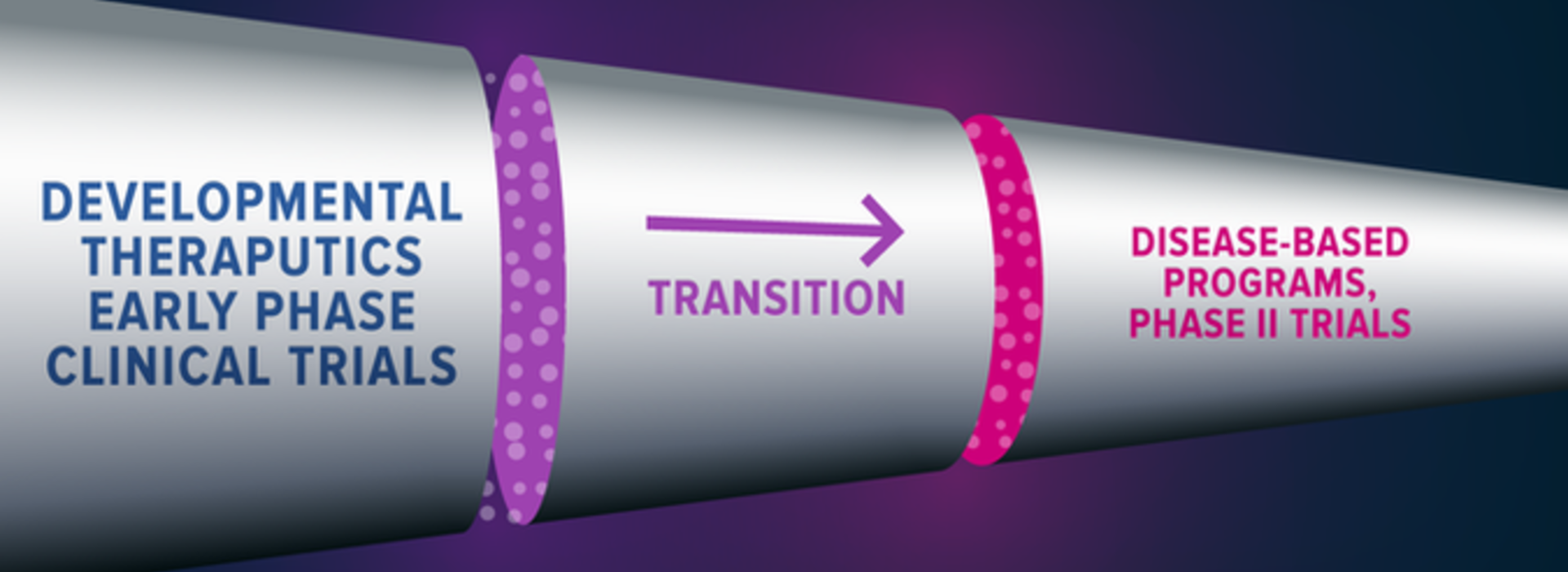
Developmental Therapeutics Getting Around Drug Resistance
The primary goal of the University of Minnesota Developmental Therapeutics Initiative (DTI) is to advance novel cancer treatments for solid tumors. With advances in personalized cancer therapy, clinicians and researchers are now looking beyond treating each organ or disease site as separate entities, aiming to target instead each tumor’s genomic or molecular alterations where they transpire. Studying lines of attack that utilize the patient’s own immune system as an anti-cancer approach. Patients with various types of advanced solid tumors may be considered for a clinical trial.
The DTI was created to give cancer patients access to these novel therapies. The DTI program fosters collaboration between lab-based and clinical researchers, and stimulates translational breakthroughs in cancer treatments. Research efforts are focused on the following major areas of investigation.
-
Target identification, validation, and characterization
-
Characterization of the mechanisms of chemo-sensitivity and drug resistance
-
Drug discovery/development
-
Clinical trial design and development
The goals of the Developmental Therapeutics Initiative.
-
Apply chemistry, structural biology, and pharmacology tools to create discoveries and convert these into clinical trials, with an emphasis on drug-resistant targets.
-
Conduct accurate early-phase trials of novel anticancer therapies, including those that combine immunotherapy with conventional targeted or cytotoxic therapies.
-
Quickly authorize new early-phase anticancer therapies by integrating genomic and expression-based patient selection.
Through the assimilation processes of discovery, development, and delivery of new anticancer agents, the DTI Program is driven to reduce the cancer burden across targeted areas and beyond. The program is driven with the help of team science as the research is carried out through seminars, conferences, journal clubs, retreats, courses, training grant collaborations, and mentoring.
The Developmental Therapeutics Clinic
Developmental Therapeutics at the clinical level is the dance of a highly collaborative, transdisciplinary research association and part of a critical translational innovation hub. This work is helping to bridge drug discovery and experimental therapeutics which translate preclinical discoveries and treatment strategies into the clinic, while returning clinical advances to the bench for refinement. The DTI Clinic is located at the M Health Fairview Clinics and Surgery Center and offers Phase 1 cancer clinical trials. This is a partnership between M Health Fairview, the University of Minnesota Medical School, Division of Hematology, Oncology, and Transplantation, the Division of Gynecologic Oncology, and the Masonic Cancer Center, University of Minnesota. There are currently eight clinical trials clinical trials on-going with this DTI program all geared to create hope for patients, create opportunities for faculty, and to build a forum for researchers to conceptualize cutting edge bench-to-bedside research.
The inspiration behind the DTI program resides in the area of novel drug development for the treatment of cancer. The University of Minnesota Medical School is home to some of the foremost investigators and scientists whose innovations in cancer biology, pharmacology, and drug development have provided treatment for a wide range of human cancers. Drs. Manish Patel and Dr. Naomi Fujioka, both experienced in conducting early-phase clinical trials, lead a team of investigators in DTI to identify innovative and promising treatments developed locally or by industry, bringing this research to treatment with patients enduring advanced cancer.
Throughout this stage in cancer trials, treatments are tested for safety, dosage and efficacy in different forms of cancer. When a new drug is being given to humans for the first time, the trial will typically comprise individuals with various kinds of cancer for which standard and/or FDA-approved treatments have been exhausted or lack a reasonable chance of efficacy. The way it works is to have a patient come into the clinic, be evaluated, talk to one of the doctors about their condition, and then be offered a “menu” of novel therapies the DTI clinic is testing that the patient can join. Taking into account the patient’s unique circumstances incorporating tumor biology, the patient’s other medical problems, and the goals of the patient. Only about three to five percent of patients with cancer ever enroll in a clinical trial. If the DTI clinic is able to escalate the number of cancer patients who enroll in clinical trials, even by as much as 15 or 20 percent, it will help to accelerate the development of new therapies for treatment as answers will evolve more quickly.
Naomi Fujioka, MD is a medical oncologist at the University of Minnesota Medical School, Division of Hematology, Oncology, and Transplantation, specializing in thoracic and head/neck malignancies. Her research is focused on developing food-based chemoprevention targeting tobacco and environmental carcinogens and teaming up with researchers to develop novel biomarkers of carcinogen-induced DNA damage. Dr. Fujioka also acts as a site principal investigator for clinical trials, and is part of the DTI team at the University of Minnesota.
Dr. Manish Patel is a physician-scientist at the University of Minnesota Medical School, Division of Hematology, Oncology, and Transplantation researching oncolytic virus for lung cancer. He serves as the associate program director for the fellowship program, leads the experimental therapeutics phase 1 clinical trials program and is part of the developmental therapeutics clinic team at the University of Minnesota. “The vision we have is that this is going to be a resource for cancer patients throughout the region to really be able to participate in cutting edge treatments for their cancer,” said Dr. Patel.
The DTI clinic focuses largely on drug-based treatments, including cellular and immune therapies, which can be tested on a range of cancers. Many of the cancer treatments being tested are developed from either University research or the pharmaceutical industry with emphasis on solid tumor treatments. Cancer treatment trials that focus on a single type of cancer are left to a specialized department to carry the trial out. What is unique about the DTI trial design is that doctors are focused on more complicated and rigorous studies with multiple tumor types.
“While we are focused on getting novel treatments to patients,” said Dr. Patel. “It is also critically important that we try to learn from these early clinical trial experiences to help shape the design of the next trial or refine the next agent we test. Reverse translation, or taking the information we learn back to the lab, is just as important as the initiation of new trials.”
“We are attempting to leverage advances in gene editing technology and manufacturing of cells,” said Dr. Patel, “to make them work better for patients with solid tumors.”
“After approval, treatments will continue to be developed,” said Dr. Fujioka. Drugs have also been developed to target specific genetic traits and other characteristics of cancer.
Novel anticancer therapy testing initiates in phase I clinical trials where testing the efficacy of new agents is becoming increasingly complex. New targets may fluctuate significantly among tumor subsets, and agents may target several pathways. The DTI program members interact extensively with cooperative groups and the biopharmaceutical industry. The program continues to develop using a "hub and spoke" model to enable the prompt transition of agents into disease-directed trials when specified by efficacy or target confirmation.
Latest Treatments for Advanced Cancers
When a patient is faced with the challenges brought on by a cancer diagnosis, especially a rare type with few treatment options, life can feel overwhelming especially when the cancer is progressing, and it is time to act right away. Drs. Fujioka and Patel and the entire DTI team comprise a group of motivated University of Minnesota clinicians specializing in cutting-edge clinical trials to treat these anxious patients that enter the DTI program with many types of cancer.
All along medical specialties, clinical trials provide the way for new medicines to move from the laboratory to the general population. Trials in phases I, II, III, and IV progressively ramp up the number of people involved as they test drugs for safety, dosage, and efficacy along the way prior to approval.
“The developmental therapeutics clinic tests novel therapies in patients with cancers who either have not responded to conventional treatments or otherwise do not have great options for treating their cancer,” said Dr. Patel. “Particularly for patients with rare tumor types. Phase I clinical trials are the only opportunity to receive cutting-edge treatments.”
Rapid accrual of patients to these types of trials is critical to getting these drugs to more-advanced clinical trials and ultimately to the Food and Drug Administration for approval for the wider community. Without the phase I trial that the DTI program offers, many therapies would not be available to patients with rare diseases.
“Each trial is a little bit different,” says Dr. Patel. “Often with phase I trials, only three patients at a time can be treated. We evaluate the safety, and then we are allowed to treat more. Most of these trials are pretty fluid, and the openings can change very rapidly.”
“The key is to maintain both hope and realistic expectations,” Dr. Fujioka says. “Hope can have many definitions depending on the individual. The clinic potentially offers treatments that cannot be accessed elsewhere, which brings hope to many. Many patients are incredibly altruistic, and hope means the possibility of helping others in addition to possibly themselves, regardless of the outcome of participating in a clinical trial.”
Many of the patients treated at the DTI clinic cannot afford to wait for new therapies to reach the public. Drs. Fujioka and Patel have been excited to see patients with previously incurable cancer develop long-term remissions with either immune therapy or targeted therapy. Developing powerful natural killer cell therapies for solid tumors using cells grown using technology based upon science developed within the University of Minnesota labs is helping to create encouraging outcomes for these patients.
Drs. Fujioka and Patel remain positive about future treatment possibilities and are inspired by the recent FDA approval of a drug that blocks the proteins causing hundreds of thousands of lung cancer cases. “New knowledge and new treatments are always coming down the pipeline,” says Dr. Fujioka. “Thanks to patients participating in clinical research and innumerable researchers dedicated to studying cancer in hopes of helping people live longer and better.”
Dean Patterson, Editor
Division of Hematology, Oncology, and Transplantation
References:
NIH National Cancer Institute Developmental Therapeutics Program https://dtp.cancer.gov/
Developmental Therapeutics Clinic; The newest treatments for advanced cancers. https://cancer.umn.edu/researchers/clinical-trials-office/developmental-therapeutics-clinic



